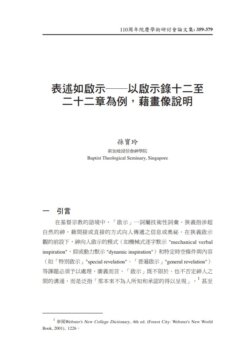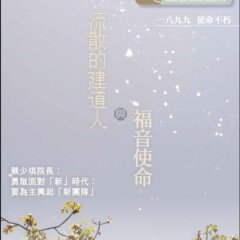表述如啟示——以啟示錄十二至二十二章為例,藉畫像說明/孫寶玲
孫寶玲
撮要
文本是先前文本的重述和演繹。分別在於說甚麼 (what),用甚麼說(sources) 和怎樣說 (how)。由是可知,文本必然是一種表述 (presentation),其中層次、元素、主題的交織,構成完全和呼應的整體,編就而成的意義場。換言之,陳述就是詮釋的籲匙。對陳述的掌握,對詮釋有決定性的作用。另一方面,陳述必然具備文化的特質和向度,如何選取素材、如何鋪陳,離不開文化的考量。陳述與文化是詮釋循環裏緊扣不分的元素。本文嘗試以啓示錄十二至二十章為例,說明陳述、文化和詮釋三者的關係。本文先從西方畫作的傳統和演變,說明陳述是意義創造中的一部分,其中文化的觀點和和元素更是不可或缺。繼而指出啓示錄是建基於猶太文化的一種演繹和陳述,其意義只有通過對猶太文化的閱讀才能有所掌握。
ABSTRACT
A text is always a re-presentation and interpretation of preceding texts. The purpose, sources, and rhetorical strategy are factors giving rise to each text’s distinctiveness. Text is therefore a form of presentation in which texture, sources, and motifs intermingle to form a web of meanings. In short, presentation is a key to hermeneutics. On the other hand, presentation is inevitably featured with cultural dimensions and qualities. Sources used, the strategy and structure of presentation are culturally conditioned. Presentation and culture are therefore essentially intertwined in hermeneutical circle. This article attempts to explain the relationship between presentation, culture, and hermeneutics with Revelation chapters 12-22. This article begins with observing features in the development in western painting tradition, suggesting that presentation plays a part in the creation of meaning that is culturally featured. This article further suggests that the Book of Revelation is a presentation and interpretation of Jewish culture, the meaning of which can only be grasped by first understanding Jewish traditions.
原載於《教牧期刊》第27期及《建道學刊》第34期合刊(2010年7月),頁359-379。







